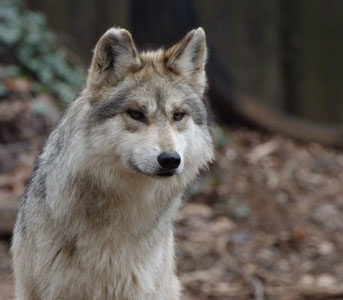In the Press: Howl ’bout Lehigh Valley Zoo’s newcomers?
By Irene Kraft and Kevin Amerman
 The Public loves the new wolves.
The Public loves the new wolves.
Seven-year-old Lucas Sprow jumped up and down to try to catch the best view of Lehigh Valley Zoo’s latest residents as they sniffed around their new home and trotted by a waterfall.
Lucas, who lives in Shillington, outside Reading, was one of hundreds of people who visited the zoo’s three new Mexican gray wolves Saturday, the day the energetic brothers were unveiled.
“I really, really, really like it,” Lucas said of the “Los Lobos” exhibit, Spanish for “The Wolves.”
The opportunity to see such wolves is rare. Mexican gray wolves are the most endangered wolves in North America, with only 40 remaining in the wild, according to the zoo.
“You look at the kids’ faces and their excitement, then you look at their parents — the big kids — and they’re enjoying it too,” said Rick Molchany, the zoo’s president and CEO.
While zoo officials knew visitors would enjoy the animals, they wondered how the wolves would take to the people. And they responded perfectly — like no one was even there.
Rich Rosevear, the zoo’s general curator, said he was a little worried the wolves would hide. But as he spoke they ran all over their large, hilly fenced-in area and took dips in a pond near the observation deck where crowds gathered throughout the morning and afternoon.
“They acted just the way they should have,” Rosevear said.
The three wolves are part of the Association of Zoos and Aquariums’ Species Survival Plan, a wildlife conservation program that conserves a select and threatened or endangered species population. The zoo also is working with the U.S. Fish and Wildlife Service’s International Recovery Program, which will reintroduce captive-born wolves into the wild.
Through the Species Survival Plan, 265 Mexican gray wolves are now living in captivity in 52 zoos and wolf sanctuaries.
The Lehigh Valley Zoo’s Mexican gray wolves are all male and will turn 4 in May. They have not been given pet names, although guests at the zoo eventually will recognize them individually. At some point, the zoo may look to guests to come up with names, Rosevear said.
However, because all Mexican gray wolves and their offspring are candidates for reintroduction to the wild, the zoo’s goal is to keep these wolves in as wild a state as possible.
“To avoid human conditioning, pet names are not used by the keepers who take care of them. In fact, even talking to them is discouraged,” Rosevear said.
“We try to make sure that they do not become acclimated to things that are directly associated with humans, such as radios, perfumes or commercial toys used for behavioral enrichment,” he said. “We also hope our guests will follow along with this important conservation plan by quietly observing these beautiful wolves and not attempt to interact with them.” …
Rather than names, the numbers assigned to the wolves to designate their breeding status — the studbook number — or the numbers used to identify them in the zoo’s collection will be used for identification and record keeping.
The wolves are considered permanent residents at the zoo, although the SSP program may determine if any of them should be relocated for breeding purposes. Because the program needs space for Mexican gray wolves, it’s also likely the program may recommend other wolves come here for breeding, Rosevear said.
Zoo guests may see the wolves eating almost as they do in the wild. They are fed carcasses of animals that would be found in their natural habitat, such as deer, rabbit and wild turkey, in addition to a dry food designed for wild dogs.
“Since we do not want them to look at livestock as prey if they were to be released in the wild, they are never fed any domestic animal products,” Rosevear said.
The average expectancy for a Mexican gray wolf in the wild is five years, but in captivity, they’ve been known to live up to 13. …
Read the full article here.
http://www.mcall.com/news/local/mc-gray-wolves-lv-zoo0403-20110402,0,7281408,full.story
Join our email list to learn what you can do to help ensure the future of these and other Mexican gray wolves.



